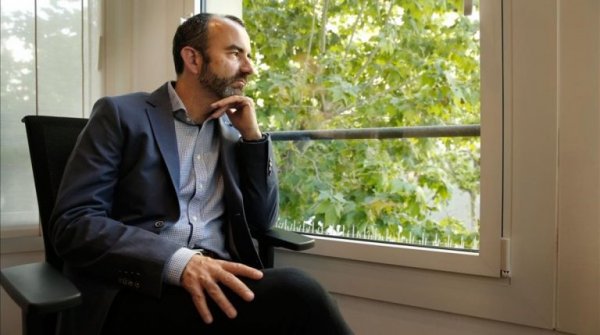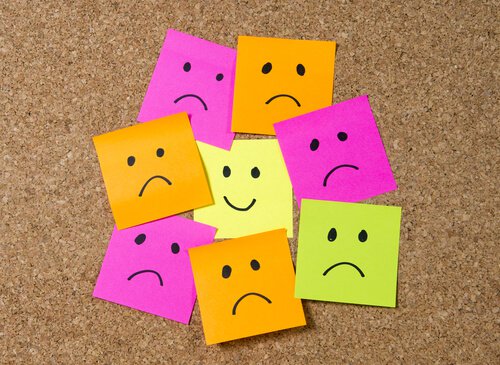Santandreu: "Use your Inner Dialogue to Be Happy"

In his last book, “Nada es tan terrible: la filosofía de los más fuertes y felices” (Nothing is so terrible: The Philosophy of the Strongest and happiest), Rafael Santandreu offers a practical manual for personal transformation and self-therapy through Inner dialogue. It’s a very thorough and original work that will give you valuable strategies based on cognitive psychology.
Santandreu stands out for his ability to make you understand the origins of your own unhappiness and the way your thoughts shape your reality.

Our Interview with Rafael Santandreu
In our interview with Rafael Santandreu, we delve deeper into the importance of how you interpret the things that happen to you, even the very worst ones.
As a psychologist and therapist specialized in brief strategic therapy, Rafael Santandreu invites you to question yourself and look inside yourself to understand how you limit your human potential.
In his latest book, Santandreu shares interesting philosophical approaches to show you how the foundation of happiness and positive psychology is your own thoughts.
“Nada es tan terrible” has original and innovative lessons to help you grow. It helps awaken your inner joy. It’s a trip worth the ride.
“The strongest and happiest people use a polished, clever, and conscious inner dialogue.”
-Rafael Santandreu-
Cognitive Psychology: Based on Modifying Inner Dialogues?
That’s right. According to Epictetus, “We aren’t disturbed by what happens to us, but by our thoughts about what happens to us”. This means that you aren’t sad because your girlfriend left you. You’re sad because you think: “I’m alone! I’ll never be happy! I need her!”
Actually, most of these adversities shouldn’t affect us as much. However, due to a very negative inner dialogue, they lead to anxiety or depression.
Do the strongest and happiest people have a special inner dialogue?
They do. They aren’t fatalists. Yes, they can be annoyed by life’s adversities, but they don’t allow them to keep them from being happy.
One of my pillars of emotional strength was Stephen Hawking, the scientist in the wheelchair. Hawking couldn’t move at all due to his condition. He said that his disease was a triviality. He thought that as long as he could still do valuable things by himself and for others, he could be happy. This is why he became one of the most important scientists of all times and a very happy person as well.
Can we all learn to be that way?
I assure you that if you apply Hawking’s personal philosophy, your emotional state will change. You won’t be affected by little things and you’ll have a lot of mental space to enjoy life. Everything’s about your inner dialogue and your beliefs about life.

What beliefs make up this new living philosophy?
One of the fundamental principles is to fight the belief that you need many things to be happy. Actually, we only need water and food every day.
Everything else is dispensable. For example, having a partner or job isn’t important to be happy. All you need to do is stop complaining and appreciate what you already have.
Do we need to be healthy to be well?
Not really. Health is the first thing we lose as we grow older. I assure you that you can still be happy even with a chronic disease. Look at Stephen Hawking again, for example. Once again, what matters is what you tell yourself.
After losing a loved one, many people get depressed. I assure you that depression is a product of their inner dialogue towards death. I believe that death is good, even beautiful. Why? Because all natural things are good and necessary.
It doesn’t matter if you live a long life or a short life. The important thing is to live a great life. People get depressed when their loved ones die. However, the world is full of people to love. They’re your siblings. Love them as you love the important people in your life that are no longer here.
According to cognitive psychology, is there a “correct” way to face adversities?
Yes. For example, my books are a collection of philosophical principles that will convince you that you can be happy no matter what. You’ll find many arguments that will make you say: “There’s nothing that can make me unhappy!”

In fact, Epictetus, the philosopher you talked about, was a slave.
Exactly. He was born a slave! His parents were slaves and he was sold after he was born. His master, Epaphroditus, took him to Rome. Despite all that, he was happy. He told himself: “While there are valuable things to do for me and others, I’ll be happy.”
Just like Stephen Hawking. You see, the key to happiness is your inner dialogue. If you control your dialogue, you’ll learn to be happy.
Is it a daily thing?
Yes. Cognitive psychology will ask you to revise what you say to yourself every day whenever something bad happens.
For example, you’re stuck in traffic. Don’t say to yourself: “This sucks! This shouldn’t be happening!” Instead, say this to yourself: “It doesn’t matter if I’m stuck here. I can do a lot of good things while I’m waiting. I can sing or even call my mom”.
Do you need to check your inner dialogue after every issue, big or small?
Exactly. Next time you’re stuck in traffic, you’ll be surprised to see how little it affects you. Another example is if someone says something nasty to you. Work on it so it won’t affect you. “I don’t need everybody to like me. It doesn’t matter if someone insults me. It’s their problem, not mine”.
How long does it take for that inner dialogue to start making us feel better?
During the first month of working hard on it, you’ll start seeing great results. After three months, you’ll feel 80% better. After a year or two, you might feel 100% better. You have to work on it every day.
You’ll feel happier, dare to do so much more, and appreciate the good things in life.
In his last book, “Nada es tan terrible: la filosofía de los más fuertes y felices” (Nothing is so terrible: The Philosophy of the Strongest and happiest), Rafael Santandreu offers a practical manual for personal transformation and self-therapy through Inner dialogue. It’s a very thorough and original work that will give you valuable strategies based on cognitive psychology.
Santandreu stands out for his ability to make you understand the origins of your own unhappiness and the way your thoughts shape your reality.

Our Interview with Rafael Santandreu
In our interview with Rafael Santandreu, we delve deeper into the importance of how you interpret the things that happen to you, even the very worst ones.
As a psychologist and therapist specialized in brief strategic therapy, Rafael Santandreu invites you to question yourself and look inside yourself to understand how you limit your human potential.
In his latest book, Santandreu shares interesting philosophical approaches to show you how the foundation of happiness and positive psychology is your own thoughts.
“Nada es tan terrible” has original and innovative lessons to help you grow. It helps awaken your inner joy. It’s a trip worth the ride.
“The strongest and happiest people use a polished, clever, and conscious inner dialogue.”
-Rafael Santandreu-
Cognitive Psychology: Based on Modifying Inner Dialogues?
That’s right. According to Epictetus, “We aren’t disturbed by what happens to us, but by our thoughts about what happens to us”. This means that you aren’t sad because your girlfriend left you. You’re sad because you think: “I’m alone! I’ll never be happy! I need her!”
Actually, most of these adversities shouldn’t affect us as much. However, due to a very negative inner dialogue, they lead to anxiety or depression.
Do the strongest and happiest people have a special inner dialogue?
They do. They aren’t fatalists. Yes, they can be annoyed by life’s adversities, but they don’t allow them to keep them from being happy.
One of my pillars of emotional strength was Stephen Hawking, the scientist in the wheelchair. Hawking couldn’t move at all due to his condition. He said that his disease was a triviality. He thought that as long as he could still do valuable things by himself and for others, he could be happy. This is why he became one of the most important scientists of all times and a very happy person as well.
Can we all learn to be that way?
I assure you that if you apply Hawking’s personal philosophy, your emotional state will change. You won’t be affected by little things and you’ll have a lot of mental space to enjoy life. Everything’s about your inner dialogue and your beliefs about life.

What beliefs make up this new living philosophy?
One of the fundamental principles is to fight the belief that you need many things to be happy. Actually, we only need water and food every day.
Everything else is dispensable. For example, having a partner or job isn’t important to be happy. All you need to do is stop complaining and appreciate what you already have.
Do we need to be healthy to be well?
Not really. Health is the first thing we lose as we grow older. I assure you that you can still be happy even with a chronic disease. Look at Stephen Hawking again, for example. Once again, what matters is what you tell yourself.
After losing a loved one, many people get depressed. I assure you that depression is a product of their inner dialogue towards death. I believe that death is good, even beautiful. Why? Because all natural things are good and necessary.
It doesn’t matter if you live a long life or a short life. The important thing is to live a great life. People get depressed when their loved ones die. However, the world is full of people to love. They’re your siblings. Love them as you love the important people in your life that are no longer here.
According to cognitive psychology, is there a “correct” way to face adversities?
Yes. For example, my books are a collection of philosophical principles that will convince you that you can be happy no matter what. You’ll find many arguments that will make you say: “There’s nothing that can make me unhappy!”

In fact, Epictetus, the philosopher you talked about, was a slave.
Exactly. He was born a slave! His parents were slaves and he was sold after he was born. His master, Epaphroditus, took him to Rome. Despite all that, he was happy. He told himself: “While there are valuable things to do for me and others, I’ll be happy.”
Just like Stephen Hawking. You see, the key to happiness is your inner dialogue. If you control your dialogue, you’ll learn to be happy.
Is it a daily thing?
Yes. Cognitive psychology will ask you to revise what you say to yourself every day whenever something bad happens.
For example, you’re stuck in traffic. Don’t say to yourself: “This sucks! This shouldn’t be happening!” Instead, say this to yourself: “It doesn’t matter if I’m stuck here. I can do a lot of good things while I’m waiting. I can sing or even call my mom”.
Do you need to check your inner dialogue after every issue, big or small?
Exactly. Next time you’re stuck in traffic, you’ll be surprised to see how little it affects you. Another example is if someone says something nasty to you. Work on it so it won’t affect you. “I don’t need everybody to like me. It doesn’t matter if someone insults me. It’s their problem, not mine”.
How long does it take for that inner dialogue to start making us feel better?
During the first month of working hard on it, you’ll start seeing great results. After three months, you’ll feel 80% better. After a year or two, you might feel 100% better. You have to work on it every day.
You’ll feel happier, dare to do so much more, and appreciate the good things in life.
This text is provided for informational purposes only and does not replace consultation with a professional. If in doubt, consult your specialist.







